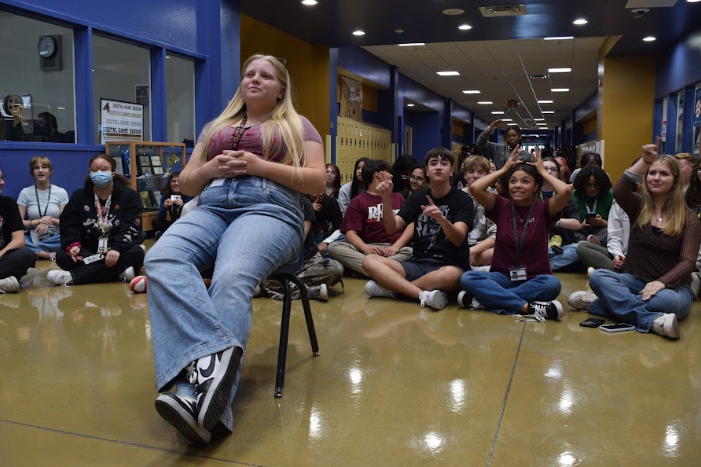For a very long time, teens with somewhere to be and no means of getting there had a primary solution: grabbing a car, grinding their practice hours and honing their skills behind the wheel. Then with enough practice and patience, the answer to their transportation dilemma appeared in the form of a license and a car; or at least it used to.
These days, there are cheaper and less grueling alternatives. Rideshare apps come at some cost, but so does gas, insurance and testing. Many stick to the much cheaper alternative of having friends and family with cars, planning to get a license in a couple weeks, months or even years.
“Teens aren’t losing anything from not getting a license nowadays,” senior Nicole Salivio said. “It isn’t as big a deal as some make it out to be. Options like taking an Uber or riding with friends make getting a license [less] of a priority. Teens have a lot going on in their lives and driving should be prioritized when they have their lives situated.”
Teen Driver Statistics by Achilles Andre Caranto
In 1995, about 63.9 percent of teens were licensed drivers. As of 2023, that percentage has fallen to 33.4 percent. For a variety of reasons, the amount of teen drivers is falling fast, with finances being a leading cause.
“Getting your license comes with a lot more expenses that not everyone can afford, especially teens,” senior Janis Laconico said. “You have to worry about gas, how you’re going to pay for your insurance, [issues] like that. Unless your parents are paying for it, but that’s still a lot of responsibility to carry with a lot of consequences.”
Even for those that don’t have to worry about finances, the general consensus around this recent dip in obtaining licenses seems to be simpler than that: Not all teens need cars.
“For me, those skills aren’t very important right now,” senior Michael Haley said. “When I go to college, I’m not going to be driving. I’ll be walking to the places I need to get to. I’m going to be on campus most of the time, so a big part of my life doesn’t include driving. For other people, I’m sure that that’s going to be important, but personally it isn’t as big of a deal.”
Today, the issue of needing an occasional ride can be solved with the click of a button, and with a decrease in teen employment, we’re seeing less necessity for licensed teens. Unless absolutely necessary, many teens just don’t see the value in getting a license.
“It’s important for teens to get their license regardless,” senior Oliver Rondez said. “Whether or not they can [use their license] after they get it, making that first step into their adulthood is a good idea to take care of now rather than later. For me, having a driver’s license means more independence. I want to make that step towards my adulthood.”
Many teens support the idea that having a license allows them to open themselves up to further opportunities, especially ones that require consistent transportation. Driving can open up new doors and experiences that wouldn’t have been as accessible without a license.
“Some teens are losing opportunities,” senior Ryan Navaratte-Pak said. “If I didn’t have one, I would definitely be restricted with many of the things I’m able to do like extracurriculars, having a job and sports. Having a license definitely [lets you] explore new doors.”
Moreover, some teens have expressed the importance of the feeling of freedom which being licensed has allowed them. This ability to be spontaneous has been considered important, especially in a city like Vegas.
“Having a driver’s license means that I basically have wings and the freedom to go anywhere I want,” senior Kimheak Chaeng said. “My dad is the only one that has a license, but works late and can’t really bring me anywhere. This leaves me out for hangouts or opportunities that I want to experience as a teenager, so a license really means a lot because I’m able to go to places and have more freedom.”
The most important point made by teens in support of licenses is that driving teaches skills like responsibility, gives a sense of independence and lets them have experiences that they might not have had otherwise. These are building blocks for growing up, maturing and eventually becoming an adult.
“Driving helps teenagers grow,” junior Aldrich Razon said. “Having that ability to drive allows for different options and experiences for teens. Personally when I started driving, it really helped me be more independent because it allowed me to dip my toes into real world scenarios, like [getting] a job. It teaches you time management and responsibility. You can’t rely on others. You’re the person responsible for yourself.”
While driving does provide many early opportunities for teens to learn important life skills, some feel that there are other ways to build upon these capabilities. Teens can learn from other experiences, such as learning to support themselves at home, seeking opportunities or taking on roles of responsibility.
“There’s other ways to learn independence,” Haley said. “Driving isn’t the only way to get that. I volunteer at UNLV for research, which teaches me independence and accountability. Planning ahead and getting ready to go to college, that also teaches independence. If you’re getting a job, living on your own and able to take care of yourself, that’s more independence than you get from just being able to drive alone. ”
Similarly, many also feel that a car isn’t even necessary for the freedom that many teens want from driving. Not having a car does have a bit more restrictions, but some are confident that just because they don’t have cars, it doesn’t mean they have to skip out on fun experiences. If there’s a will, there’s a way.
“Teens lose the freedom to socialize and experience life if they limit themselves,” senior Sebastian Huynh said. “Taking the bus, carpooling with friends or even just walking are always options. For the vast majority, transportation is possible. They just don’t want it enough. The world is your oyster and you don’t need a tool to crack it open.”
In the end, the question of whether or not licenses are still important is one that remains up for high debate. Teen drivers and the way they have developed in an everchanging culture is a complex mix of ideas, perspectives and experiences. These concepts shape our society; a society teens need to learn to navigate, with or without a car.
“The importance of a drivers license depends a lot on each individual teen,” senior Carmen Lynn Yap said. “It’s definitely a big deal, as it opens up a world of more freedom, independence and responsibility; but at the same time, each teen has their own views on its importance in their life, whether it’s a necessity or something they dread attempting.”

![Weighing her options, senior Allyana Abao decides between going on a practice drive or calling an Uber. Though unlicensed, Abao has considered driving to be a significant milestone of teen independence despite alternatives that provide much easier solutions.
“You're able to be independent and not rely on others,” Abao said. “You're able to get a job, get things that you need, go places you need to go. I have so many places that I want to go to and I ask [my family] for so much. I want to be independent to where they know that I can do things on my own, so they know that they don't have to be there for me.”](https://southwestshadow.com/wp-content/uploads/2025/10/IMG_2922-1200x900.jpg)
![Looking at the board, former BSU secretary Christina Altaye begins to prepare for BSU’s second year of Club Feud. This year, “Are You Smarter Than a Ninth Grader?” will be replacing this event. “I think it’s a fun change [to Club Feud],” BSU Activities Director Hellen Beyene said. “[I think] it’s always fun to do something new and different.”](https://southwestshadow.com/wp-content/uploads/2025/10/Screenshot-2025-09-29-11.06.43.png)

!["I will be attending Trunk or Treat [for FCCLA]" junior Crystal Li said. "We're gonna use Mr. Harbeson's car, and we will be [hosting three different activities]."](https://southwestshadow.com/wp-content/uploads/2025/10/IMG_0980-1200x900.png)


